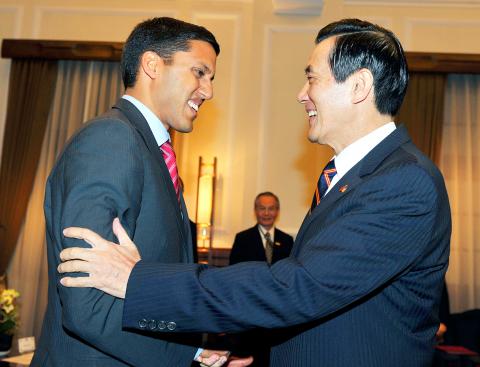More than half a century after the US phased out its economic assistance to Taiwan, the head of the US federal government aid agency yesterday encouraged Taiwan to become a provider of development assistance across the world.
United States Agency for International Development (USAID) Administrator Rajiv Shah singled out three areas in which the US and Taiwan could work together to help create a safe and prosperous world for all the people: humanitarian assistance, food security and health.
The US would like to engage in expanded and more effective cooperation with Taiwan in delivering humanitarian assistance, eliminating hunger and child malnutrition, and investing in healthcare to reduce infectious diseases.

Photo: CNA
Leading the efforts of more than 8,000 professionals in 80 missions around the world after he was sworn in two years ago, Shah was invited by the American Institute in Taiwan to deliver a speech at the “American Footprints in Taiwan” exhibition yesterday.
In his speech, he cited a number of cases of Taiwan’s transformation from a country receiving aid from the US to a partner with the US in development cooperation.
The assistance the US offered to Taiwan and South Korea in the Cold War cost less than 1 percent of its budget, but “have paid tremendous dividends,” he said.
“Our development cooperation [with Taiwan] has evolved. We no longer provide traditional development assistance to the country. Instead, we have an active conversation about how we might work together,” he said.
Shah referred to the situation in a refugee camp on the Kenya-Somalia border to highlight the importance of international cooperation in development.
“Designed 20 years ago for about 80,000 people, today, nearly half a million refugees live in this environment. The drought in the Horn of Africa affected more than 1.3 million people, who have experienced hunger and deprivation for the last four months. Most of the world barely notices that more than 30,000 children under the age of five have died of hunger or hunger-related diseases,” he said.
More than 960 million people worldwide go to bed hungry every night, Shah said, but he added that it would be possible to reduce this number to close to 200 million “if we double development investment with real policy reform.”
A problem that had to be addressed in policy reform was to examine domestic policies as well as international standards and norms for trade, so as to achieve development results, Shah said.
“Over the last 50 or 60 years, people who led development agencies had not necessarily done as much as they should to have a voice and have a seat at the table to discuss issues like global and bilateral trade negotiations,” he said.
US President Barack Obama’s administration has tried to correct that, “but we were open-eyed about how difficult the challenge is. The next trade and development round [of talks] will be conducted in just a few weeks in Geneva, and we will put a lot of development issues on the table there,” he said.

MAKING WAVES: China’s maritime militia could become a nontraditional threat in war, clogging up shipping lanes to prevent US or Japanese intervention, a report said About 1,900 Chinese ships flying flags of convenience and fishing vessels that participated in China’s military exercises around Taiwan last month and in January last year have been listed for monitoring, Coast Guard Administration (CGA) Deputy Director-General Hsieh Ching-chin (謝慶欽) said yesterday. Following amendments to the Commercial Port Act (商港法) and the Law of Ships (船舶法) last month, the CGA can designate possible berthing areas or deny ports of call for vessels suspected of loitering around areas where undersea cables can be accessed, Oceans Affairs Council Minister Kuan Bi-ling (管碧玲) said. The list of suspected ships, originally 300, had risen to about

DAREDEVIL: Honnold said it had always been a dream of his to climb Taipei 101, while a Netflix producer said the skyscraper was ‘a real icon of this country’ US climber Alex Honnold yesterday took on Taiwan’s tallest building, becoming the first person to scale Taipei 101 without a rope, harness or safety net. Hundreds of spectators gathered at the base of the 101-story skyscraper to watch Honnold, 40, embark on his daredevil feat, which was also broadcast live on Netflix. Dressed in a red T-shirt and yellow custom-made climbing shoes, Honnold swiftly moved up the southeast face of the glass and steel building. At one point, he stepped onto a platform midway up to wave down at fans and onlookers who were taking photos. People watching from inside

Japan’s strategic alliance with the US would collapse if Tokyo were to turn away from a conflict in Taiwan, Japanese Prime Minister Sanae Takaichi said yesterday, but distanced herself from previous comments that suggested a possible military response in such an event. Takaichi expressed her latest views on a nationally broadcast TV program late on Monday, where an opposition party leader criticized her for igniting tensions with China with the earlier remarks. Ties between Japan and China have sunk to the worst level in years after Takaichi said in November that a hypothetical Chinese attack on Taiwan could bring about a Japanese

STREAMLINED: The dedicated funding would allow the US to transfer equipment to Taiwan when needed and order upgraded replacements for stockpiles, a source said The US House of Representatives on Thursday passed a defense appropriations bill totaling US$838.7 billion, of which US$1 billion is to be allocated to reinforcing security cooperation with Taiwan and US$150 million to replace defense articles provided to the nation. These are part of the Consolidated Appropriation Act, which the US House yesterday passed with 341 votes in favor and 88 against. The act must be passed by the US Senate before Friday next week to avoid another government shutdown. The US House Committee on Appropriations on Monday unveiled the act, saying that it allocates US$1 billion for the Taiwan Security Cooperation Initiative